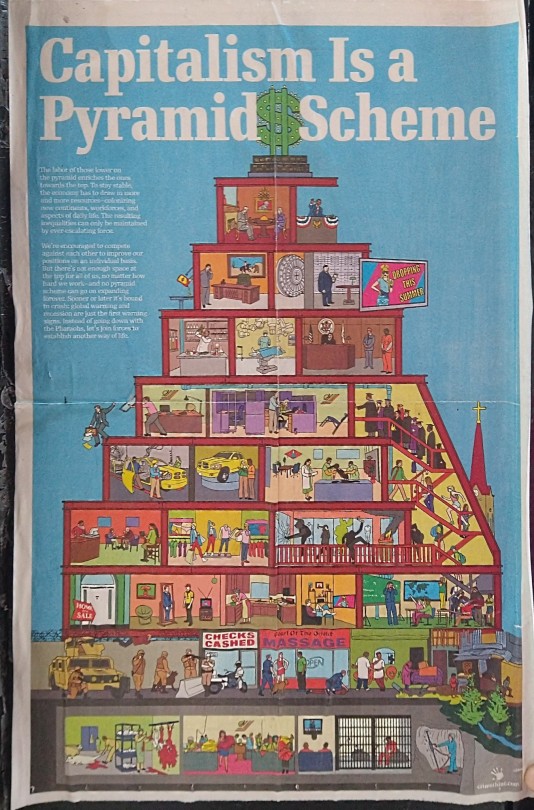#crimethinc
Text
If your heart is broken by the horrors in Gaza and you are prepared to bear significant consequences to try to stop them, we urge you to do everything in your power to find comrades and make plans collectively. Lay the foundations for a full life of resistance to colonialism and all forms of oppression. Prepare to take risks as your conscience demands, but don’t hurry towards self-destruction. We desperately need you alive, at our side, for all that is to come.
Ⓐ RIP Aaron Bushnell (1998-2024) Ⓐ
205 notes
·
View notes
Text

Read here.
74 notes
·
View notes
Text
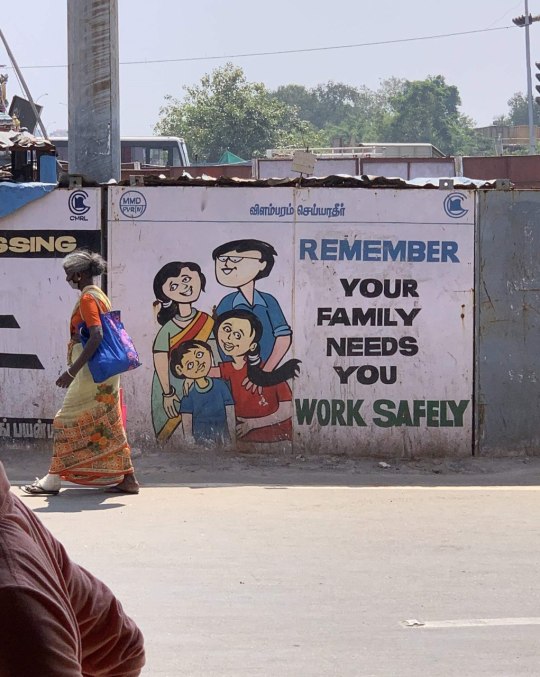
Let’s be clear about this—critiquing work doesn’t mean rejecting labor, effort, ambition, or commitment. It doesn’t mean demanding that everything be fun or easy. Fighting against the forces that compel us to work is hard work. Laziness is not the alternative to work, though it might be a byproduct of it.
The bottom line is simple: all of us deserve to make the most of our potential as we see fit, to be the masters of our own destinies. Being forced to sell these things away to survive is tragic and humiliating. We don’t have to live like this.
— CrimethInc., The Mythology of Work
50 notes
·
View notes
Text
"A left opposition that counts on the institutions, on the legitimacy of a discourse on human rights, on judgements in the Hague court, that is committed to peace and democratic rituals - is not prepared to face an enemy eager to murder in the name of God and country."
-The Ex-Worker Podcast, episode #91 - Elections, Fascism, and Popular Resistance in Brazil
195 notes
·
View notes
Note
heyo! what can i, a teen in a really boring wealthy neighborhood with no queer community, do to combat fascism/make people aware of how wasteful and bigoted they are/generally fuck things up?
thanks so much!!
Before we get into the meat of your question, one thing we're hearing from this ask that you're going to want to keep an eye on is the idea that you know more than other people and need to educate people from a place of superiority over them. This is something that liberals do quite a lot, and while there's not a lot of reason to be sympathetic to reactionaries, something they are justified in responding negatively to is the patronizing idea that they just lack awareness of how wasteful or bigoted they are (in reality, they have a different set of values, and those values lead them to reasonable, but harmful, ends).
That is not the main point of your ask or this answer, but just watch in yourself the urge to view your self as better than others, speaking down to them.
OK, to the main point of your ask: A really important first step is going to be honestly evaluating the level of risk you're willing to take.
If you are a teenager in a wealthy family, this is probably the time when you are least likely to be meaningfully punished for, for example, breaking laws. However, there will may still be consequences for you that you don't like. Do you have parental support? Do you rely on them for your finances, or do you have some independent income? What is your support network like in general in case you make some of your peers or authority figures upset with you? Etc.
So that's the first thing: think about what sort of consequences you are currently prepared to deal with, with the understanding that may change later for you.
To give you one example: graffiti is great. The one that will probably get you in the most trouble but has some of the highest utility is spraypainting. Of course, if you don't already have artistic hobbies, it may be obvious if you go out and buy a bunch of spraypaint cans then tags start showing up all over your neighborhood, and this might be something you want to keep in mind. But there's also slap stickers, mop markers, wheatpasting. Actually, @crimethinc has a few guides on this already.
That's one example of an area that you can start doing things in with minimal resources and without needing a large group of people. It allows you to get started, which is the important thing. You are transformed by your practices much more than your plans for future practices, and you'll learn lots of things with real understanding that you only learned about from reading or hearing someone else talk about it.
But you do probably want to do things with other people, and most of them will be initially constrained by legality, so start talking to your peers if you aren't already. Don't lead with, "Hey, do you want to do illegal things together?" (and again, that may not be what you're ready for now, anyway). However, you do need to find other people who are interested in the same sorts of things that you are, and face-to-face conversations are the best way to go about this whenever possible.
You said you're a teen, so the assumption is that you're in school. If so, is there an issue on your campus that lots of your fellow students have a grievance against? Can you organize against that?
For example, is there a tardy policy that people feel is unfair? Can you work toward a collective protest by making everyone be tardy to class for a period, a whole day, a whole week, to overwhelm the system? Does the school have rules that are queerphobic? Is there a perhaps smaller group of people who care about that who can organize a walkout?
If you're out of school and at a job, do you have a union there? Do you have a groupchat that excludes management in order to complain about scheduling or unsafe duties or wage theft? Since it sounds like you still live at home, you're probably more willing to take risks at work than people who rely on jobs to pay rent and avoid eviction, but you likely share some concerns in common you can act on.
You're going to best know the issues local to you, but it's a place to start and get people in the practice of self-organizing and acting directly against hierarchical power.
In doing that, you're going to find other people who are perhaps willing to do illegal acts like graffiti with you. Or who have completely different skills and interests, for example cooking. Meals are a good way to bring people together and bond, and can also be extended to others who need it. By getting to know someone who knows how to cook, you can learn skills that help you later, like starting a local "Food Not Bombs" group for folks who would otherwise miss meals.
There's a lot of things that you can do, can do yourself, and can organize with others directly. It is not easy, but it's often very fun, and it will give you skills you can use later in life, as well as open the imagination of lots of other people about what can be done and how.
CrimethInc again has lots of other resources that you may want to become familiar with:
("Theory" and "praxis" aren't really in tension with one another. You read things other people have done to take advantage of their mistakes and experiences, but you still have to go out and do things yourself to really understand it for your situations and yourself.)
42 notes
·
View notes
Text
New Zine: “The Forest in the City—Two Years of Forest Defense in Atlanta, Georgia.”
We’ve prepared a zine version of our article, “The Forest in the City—Two Years of Forest Defense in Atlanta, Georgia.”
Please print these out and distribute them in your community!
https://crimethinc.com/zines/the-forest-in-the-city
#StopCopCity
#DefendtheAtlantaForest
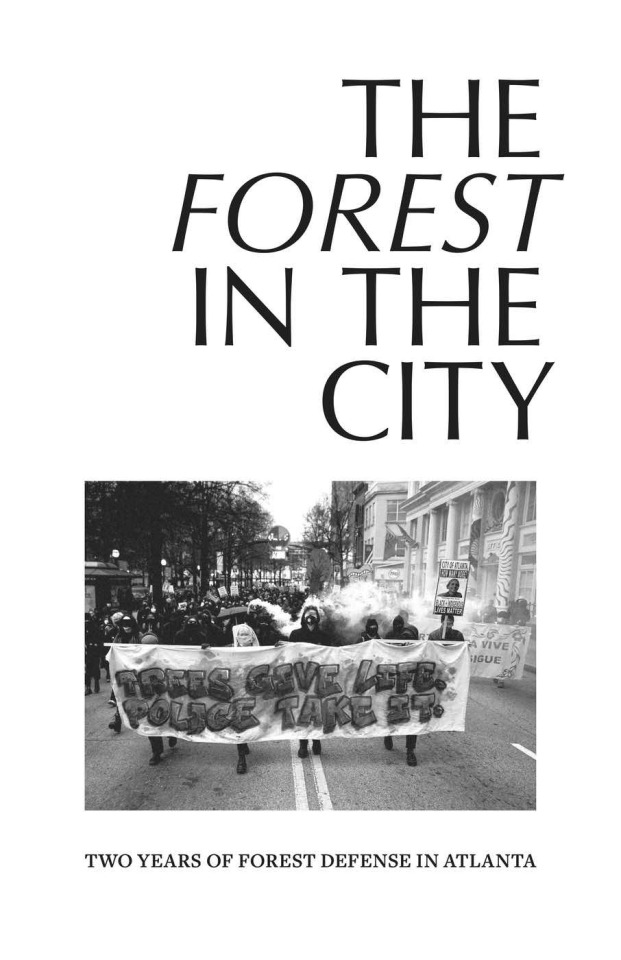
287 notes
·
View notes
Text

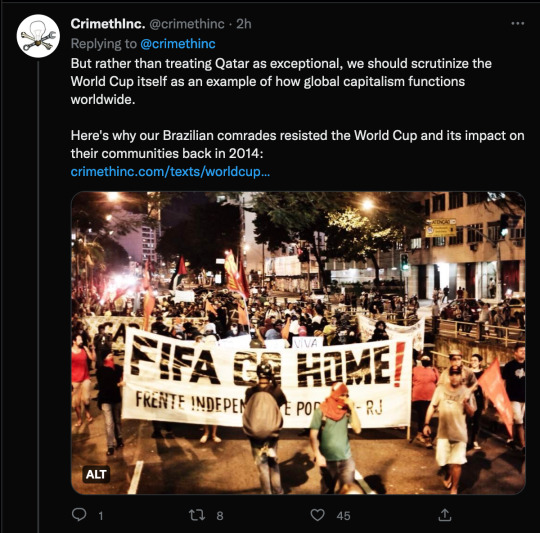

[Image description: A three tweet thread from Crimethinc. The tweets read as follows:
"As the World Cup opens in Qatar, our thoughts are with the migrant workers who suffered to make it possible. We still recall how Qatar was the only government that was willing to host the next World Trade Organization summit after demonstrators shut it down in Seattle in 1999." Photograph of a woman raising her fist in front of a yellow banner that reads "#FIFA GO HOME" with a crowd of people in the background.
"But rather than treating Qatar as exceptional, we should scrutinize the World Cup itself as an example of how global capitalism functions worldwide. Here's why our Brazilian comrades resisted the World Cup and its impact on their communities back in 2014: https://crimethinc.com/2014/06/12/feature-why-riot-against-the-world-cup" Photograph of people marching with a white banner that reads "FIFA GO HOME!" with something else written below it in a foreign language. There are people blocking the words of the banner.
The difference between sport as a corporate-controlled media spectacle and sport as a participatory, self organized pursuit is equivalent to the difference between capitalist authoritarianism and anarchy. More skateboarding, black blocs, and pick up games, less profiteering." Photograph of a person in a crowd wearing a black hoodie while holding a black skateboard with writing in white chalk that reads "NÃO VAI TER COPA!"
/end ID]
422 notes
·
View notes
Text

On Sunday, February 25, we received an email from a person who signed himself[1] Aaron Bushnell.
It read,
Today, I am planning to engage in an extreme act of protest against the genocide of the Palestinian people. The below links should take you to a livestream and recorded footage of the event, which will be highly disturbing. I ask that you make sure that the footage is preserved and reported on.
We consulted the Twitch account. The username displayed was “LillyAnarKitty,” and the user icon was a circle A, the universal signifier for anarchism—the movement against all forms of domination and oppression.
In the video, Aaron begins by introducing himself. “My name is Aaron Bushnell. I am an active-duty member of the US Air Force and I will no longer be complicit in genocide. I’m about to engage in an extreme act of protest—but compared to what people have been experiencing in Palestine at the hands of their colonizers, it’s not extreme at all. This is what our ruling class has decided will be normal.”
The video shows Aaron continuing to film as he walks to the gate of the Israeli embassy in Washington, DC, puts down the phone, douses himself in a flammable liquid, and sets himself alight, shouting “Free Palestine” several times. After he collapses, police officers who had been watching the situation unfold run into the frame—one with a fire extinguisher, another with a gun. The officer continues pointing the gun at Aaron for over thirty seconds as Aaron lies on the ground, burning.
Afterwards, police announced that they had called in their Explosive Ordinance Disposal Unit.
We have since confirmed the identity of Aaron Bushnell. He served in the United States Air Force for almost four years. One of his loved ones described Aaron to us as “a force of joy in our community.” An online post described him as “an amazingly gentle, kind, compassionate person who spends every minute and penny he has helping others. He is silly, makes anyone laugh, and wouldn’t hurt a fly. He is a principled anarchist who lives out his values in everything he does.”
Aaron’s friends tell us that he has passed away as a consequence of his injuries.
All afternoon, while other journalists were breaking the news, we discussed how we should speak about this. Some subjects are too complex to address in a hasty social media post.
The scale of the tragedy that is taking place in Gaza is heartrending. It exceeds anything we can understand from the vantage point of the United States. Over 30,000 Palestinians have been killed, including over 12,000 children. More than half of all inhabitable buildings in all of Gaza have been destroyed, along with the majority of hospitals. The vast majority of the population are living as refugees with little access to water, food, or shelter.
The Israeli military is now planning a ground invasion of Rafah that will add untold numbers of casualties to this toll. It is not hyperbole to say that we are witnessing the deliberate commission of genocide. All available evidence indicates that the Israeli military will continue killing Palestinians by the thousand until they are forced to stop. And the longer this bloodshed goes on, the more people will die in the future, as other governments and groups imitate the precedent set by the Israeli government.
The United States government bears equal responsibility in this tragedy, having armed and financed Israel and provided it with impunity in the sphere of international relations. Within Israel, the authorities have effectively suppressed protest movements in solidarity with Gaza. If protests are going to exert leverage towards stopping the genocide, it is up to people in the United States to figure out how to accomplish that.
But what will it take? Thousands across the country have engaged in brave acts of protest without yet succeeding in putting a halt to Israel’s assault.
Aaron Bushnell was one of those who empathized with the Palestinians suffering and dying in Gaza, one of those haunted by the question of what our responsibilities are when we are confronted with such a tragedy. In this regard, he was exemplary. We honor his desire not to stand by passively in the face of atrocity.
The death of a person in the United States should not be considered any more tragic—or more newsworthy—than the death of a single Palestinian. Still, there is more to say about his decision.
Aaron was the second person to self-immolate at an Israeli diplomatic institution in the United States. Another demonstrator did the same thing at the Israeli consulate in Atlanta on December 1, 2023. It is not easy for us to know how to speak about their deaths.
Some journalists see themselves as engaged in the neutral activity of spreading information as an end in itself—as if the process of selecting what to spread and how to frame it could ever be neutral. For our part, when we speak, we presume that we are speaking to people of action, people like ourselves who are aware of their agency and are in the process of deciding what to do, people who may be wrestling with heartache and despair.
Human beings influence each other both through rational argument and through the infectiousness of action. As Peter Kropotkin put it, “Courage, devotion, the spirit of sacrifice are as contagious as cowardice, submission, and panic.”
Just as we have a responsibility not to show cowardice, we also have a responsibility not to promote sacrifice casually. We must not speak carelessly about taking risks, even risks that we have taken ourselves. It is one thing to expose oneself to risk; it is another thing to invite others to run risks, not knowing what the consequences might be for them.
And here, we are not speaking about a risk, but about the worst of all certainties.
Let’s not glamorize the decision to end one’s life, nor celebrate anything with such permanent repercussions. Rather than exalting Aaron as a martyr and encouraging others to emulate him, we honor his memory, but we exhort you to take a different path.
“This is what our ruling class has decided will be normal.”
These words of Aaron’s haunt us.
He is right. We are rapidly entering an era in which human life is treated as worthless. This is obvious in Gaza, but we can see it elsewhere around the world, as well. With wars proliferating around the Mideast and North Africa, we are poised on the threshold of a new age of genocides. Even inside the United States, mass casualty incidents have become routine, while an entire segment of the underclass is consigned to addiction, homelessness, and death.
As a tactic, self-immolation expresses a logic similar to the premise of the hunger strike. The protester treats himself or herself as a hostage, attempting to use his or her willingness to die to pressure the authorities. This strategy presumes that the authorities are concerned with the protester’s well-being in the first place. Today, however, as we wrote in regards to the hunger strike of Alfredo Cospito,
No one should have any illusions about how governments view the sanctity of life in the age of COVID-19, when the United States government can countenance the deaths of a million people without blushing while the Russian government explicitly employs convicts as cannon fodder. The newly-elected fascist politicians who govern Italy have no scruples about consigning whole populations to death, let alone permitting a single anarchist to die.
In this case, Aaron was not an imprisoned anarchist, but an active-duty member of the US military. His LinkedIn profile specifies that he graduated from basic training “top of flight and top of class.” Will this make any difference to the US government?
If nothing else, Aaron’s action shows that genocide cannot take place overseas without collateral damage on this side of the ocean. Unfortunately, the authorities have never been especially moved by the deaths of US military personnel. Countless US veterans have struggled with addiction and homelessness since returning from Iraq and Afghanistan. Veterans commit suicide at a much higher rate than all other adults. The US military continues to use weapons that expose US troops to permanent brain injuries.
Members of the military are taught to understand their willingness to die as the chief resource they have to put at the service of the things they believe in. In many cases, this way of thinking is passed down intergenerationally. At the same time, the ruling class takes the deaths of soldiers in stride. This is what they have decided will be normal.
It is not willingness to die that will sway our rulers. They really fear our lives, not our deaths—they fear our willingness to act collectively according to a different logic, actively interrupting their order.
Many things that are worth doing entail risks, but choosing to intentionally end your life means foreclosing years or decades of possibility, denying the rest of us a future with you. If such a decision is ever appropriate, it is only when every other possible course of action has been exhausted.
Uncertainty is one of the most difficult things for human beings to bear. There is a tendency to seek to resolve it as quickly as possible, even by imposing the worst-case scenario in advance—even if that means choosing death. There is a sort of relief in knowing how things will turn out. Too often, despair and self-sacrifice mingle and blur together, offering an all-too-simple escape from tragedies that appear unsolvable.
If your heart is broken by the horrors in Gaza and you are prepared to bear significant consequences to try to stop them, we urge you to do everything in your power to find comrades and make plans collectively. Lay the foundations for a full life of resistance to colonialism and all forms of oppression. Prepare to take risks as your conscience demands, but don’t hurry towards self-destruction. We desperately need you alive, at our side, for all that is to come.
As we wrote in 2011 in reference to the self-immolation of Mohamed Bouazizi,
Nothing is more terrifying than departing from what we know. It may take more courage to do this without killing oneself than it does to light oneself on fire. Such courage is easier to find in company; there is so much we can do together that we cannot do as individuals. If he had been able to participate in a powerful social movement, perhaps Bouazizi would never have committed suicide; but paradoxically, for such a thing to be possible, each of us has to take a step analogous to the one he took into the void.
Let’s admit that the kind of protest activity that has taken place thus far in the United States has not served to compel the US government to compel a halt to the genocide in Gaza. It is an open question what could accomplish that. Aaron’s action challenges us to answer this question—and to answer it differently than he did.
We mourn his passing.
[1] In the email, Aaron specified his pronouns as he/him.
#gaza#palestine#aaron bushnell#self immolation#self harm#solidarity#protest#crimethinc#community building#practical anarchy#practical anarchism#anarchist society#practical#revolution#anarchism#daily posts#communism#anti capitalist#anti capitalism#late stage capitalism#organization#grassroots#grass roots#anarchists#libraries#leftism#social issues#economy#economics#climate change
11 notes
·
View notes
Text
"Let’s not glamorize the decision to end one’s life, nor celebrate anything with such permanent repercussions. Rather than exalting Aaron as a martyr and encouraging others to emulate him, we honor his memory, but we exhort you to take a different path."
11 notes
·
View notes
Text
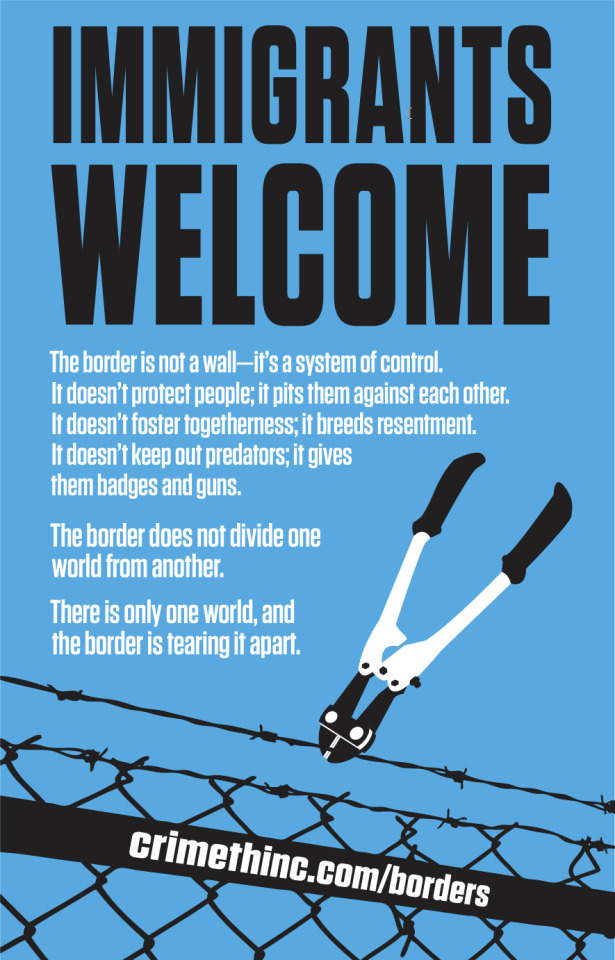
TEXT:
Immigrants Welcome
The border is not a wall - it's a system of control.
It doesn't protect people; it pits them against each other.
It doesn't foster togetherness; it breeds resentment.
It doesn't keep out predators; it gives them badges and guns.
The border does not divide one world from another.
There is only one world, and the border is tearing it apart.
crimethinc
76 notes
·
View notes
Text
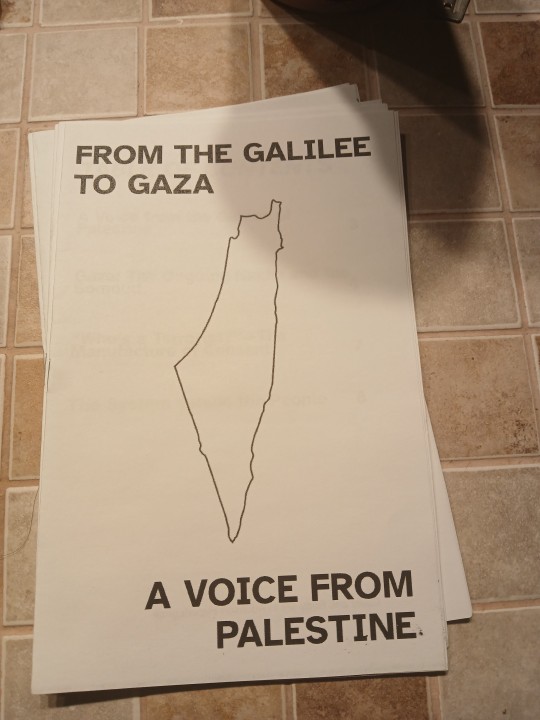
Read here.
15 notes
·
View notes
Text
“The bottom line is simple: all of us deserve to make the most of our potential as we see fit, to be the masters of our own destinies. Being forced to sell these things away to survive is tragic and humiliating. We don’t have to live like this.”
— via @crimethinc , The Mythology of Work
youtube
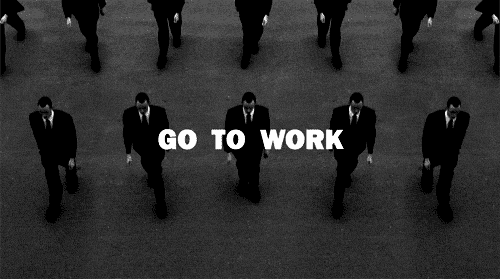
#crimethinc#the mythology of work#slavery#wage slavery#slavetothewage#leftistquotes#book quotes#quotes#george carlin#quoteoftheday#book quote#life quote#beautiful quote#quote#quotable#class war#ausgov#politas#auspol#tasgov#taspol#australia#fuck neoliberals#neoliberal capitalism#anthony albanese#albanese government#eat the rich#eat the fucking rich#capitalism#anti capitalist
10 notes
·
View notes
Text
The Youth Move Forward
The Palestinians feel betrayed and abandoned by the world. People only remember them when there’s an ongoing genocidal campaign, and even then, everybody is busy talking about how “complicated” the situation is. I’m not sure if they have anyone to trust, including their own “leadership.”
The Shabab, the youth fighting in the streets, the kids erecting barricades against the police and setting trash bins on fire, are completely alienated from any form of political force; they work in small informal groups, and many of them don’t give a fuck about politics at all. They come from the far edges of Palestinian society in 48, the direct consequence of the Zionist attempt to reduce this society to internal chaos. They are gangsters, drug dealers, outlaws of any kind, youth without a future from the poorest villages, towns, and neighborhoods of 48 Palestine, the lumpenproletariat, and—the most important thing—they are completely uncontrollable. The traditional politics of organizations, political parties, respectable religious leaders, and NGOs means nothing to them.
The new generation in Palestine has nothing left to lose. Even according to Israel’s infamous Shin Bet, they really are ungovernable. Whenever a riot or an uprising gets out of control, the authorities and security agencies look for “responsible” adults, respected “community leaders” to pacify the situation. But when you invest so much power in breaking a society from the inside to such an extent, you create an enemy that you can’t negotiate with, because he has zero fear of you and nothing to rely on or hope for. There is no going back to normal.
And they are being completely vilified. The media propaganda machine treats them as nothing but criminals, terrorists, savages, bloodthirsty pogromists, and they don’t get to have a voice. The riots are presented as nothing more than an outburst of violent anger from some hooligans, with the idea that our police force, intelligence agencies, and prison system will deal with them. It looks as though everybody decided to continue to push them as low as possible, to sweep them under the rug, to treat them as nothing more than monstrous murderers until the next outburst. Zionist apartheid is also a class system, and they hate poor Palestinians the most.
The uprising is also, of course, a form of class warfare, beyond the regular scope of ethnic conflict. I’ve read somewhere that during the first intifada, in its early days, many of the youth who revolted in Gaza and beyond weren’t very political and most of the attacks were directed against richer Palestinians. This goes way back to the great Arab revolt of 1936, when many of the attacks involved the Falahis, the peasant population of Palestine, acting against the urban elite. This dimension of the class struggle within Palestinian society is always erased from history, in favor of a more simplified ethnic conflict of Arabs against Jews.
This class struggle is always pushed aside once the big parties, the militarist factions, manage to take over; the first intifada, for example, was shut down by the Palestine Liberation Organization (PLO). It was quickly transformed from a popular mass struggle to a top-down controlled opposition in the hands of a few corrupted bureaucrats. As we all know, once the militias and the professional revolutionaries take over, the people become spectators in their own “liberation,” and the mass popular appeal of the resistance is lost. The PLO and Fatah crushed the intifada in order to get the Oslo accords going, which divided the West Bank into small cantons and introduced the so-called Palestinian Authority. Fatah became the de facto long arm of Israel and the occupation, managing the apartheid from within. A similar (though not identical) process is taking place now with Hamas, in my opinion.
While I was composing this, the focus shifted completely to rockets striking Israeli cities from Gaza. Nine people in Israel died from Hamas rockets—including Palestinians, like in the village of Dahamash near Ramle. A few Hamas rockets reached as far as the West Bank. Rockets also came from Lebanon. The protests largely waned, and we don’t see large riots anymore. One can’t help but feel that Hamas and the militarist factions interrupted the birth of a popular, mass movement in the streets, in the inner cities of the occupation, which could have been capable of creating real damage to the stability of the state.
We can clearly see who benefits from this. The anarchy within Israeli cities is over, and Israel can sell the same old story to the world about us fighting Islamist jihadist terrorists who are shooting rockets at our cities. It’s a much more convenient story, and much easier to deal with. Perhaps the strategy of weakening the secular revolutionary Marxist fronts of the 1980s and strengthening Hamas has paid off. Reactionary ideologies are easier to control, and whenever needed, they can take over the struggle and kill mass movements.
In this system, everybody plays his part. The left does what the left always, historically, does in times of social upheaval: try to pacify the resistance and absorb its energy in order to direct it towards more “acceptable” (i.e., ineffective) terrain. The same old outdated tactics, boring predictable demonstrations, “non-violent” nonsense, and empty talks about shallow “co-existence,” peace, and democracy. There’s nothing really to expect from what’s left of the Israeli Jewish left, but even the Arab political parties have proved to be completely disconnected from what’s happening in the streets.
The communist “radical leftist” Hadash party from the Joint Arab List and the Ra’am party both got into the Knesset (the Israeli parliament) in the elections of March 23. They urged people to protest lawfully and refrain from violence. No wonder the youth are completely alienated from them. For 48 Palestinians, the Arab parties in the Knesset are the same thing that the Fatah and the PA are for 67 (West Bank) Palestinians: another face of the occupation, sellouts, collaborators, conflict managers, a tool of pacification for the regime. Just like Syriza in Greece or Podemos in Spain, they appear in mass movements to appropriate the language and the energy of the people revolting in order to channel all of it back into acting within the system—and of course, in the moment of truth, they will completely betray people. I doubt they have any credibility left now.
It has almost become cliché to mention this, but the problem of the Palestinians is not just the far-right assholes, but Zionism. Israeli racist mobs are the direct consequence of a country established on deeply racist roots—a settler colonial project built on the ruins of villages and the driving away of the indigenous population, of a Jewish supremacist state—at the expanse of everyone else. Israel is probably one of the worst examples of a nation state as a way of solving things for oppressed people. It’s a lot easier for Israelis to get disgusted by far-right hooligans attacking a Palestinian, while the IDF’s genocidal campaign in Gaza (let alone the violent birth of this state) either goes unquestioned or is completely accepted. The IDF is the “people’s army,” and it is putting the platform of “Death to Arabs” into practice more efficiently than any grassroots fascist ever could.
Right now, the Gaza Strip is completely in ruins. Military airplanes drop bombs on clinics, a media tower fell down, entire neighborhoods are erased. The situation is unbearable. As I’m writing this, about 250 people have been killed and thousands are displaced. Gaza has been under siege since 2007; it was a hell on earth before the current massacre, the biggest open prison on earth, and now it has reached a situation of human catastrophe. This is mainstream Zionism, not the extremist edges.
(2021-05-29)
#repost of someone else’s content#CrimethInc#Palestine#classism#adultism#youthlib#youth liberation#Palestinian anarchism#anarchism
17 notes
·
View notes
Text
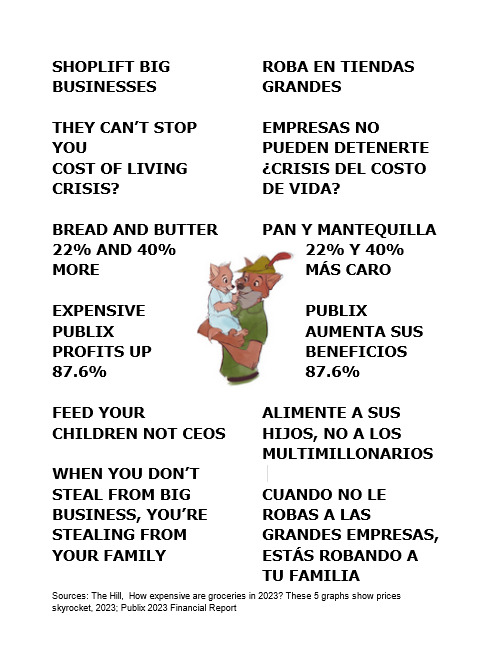
wheatpaste poster i made for southern united states pls feel free to use and put up in any publixes you can
#anarchism#anarchy#socialism#social media#mutual aid#communism#community support#news#family#food prices#poster#wheatpaste#democrats#crimethinc#crust punk#punk music#solar punk#spider punk#punk rock#hobie brown#atsv hobie#shopping#politics#publix#south#florida#georgia#south carolina#alabama#billionaire
33 notes
·
View notes
